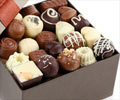Chocolates that melt into a gooey mess at the bottom of a bag on a sweltering day are one inconvenience that people living in the warmer parts of the world know all too well.
Chocolates that melt into a gooey mess at the bottom of a bag on a sweltering day are one inconvenience that people living in the warmer parts of the world know all too well.
But this may soon be a thing of the past, thanks to a firm in this chocolate-loving country where chocolate is also serious business.With sites notably on Asia, the Barry Callebaut firm, a key player in the chocolate business, is developing a variety that withstands temperatures up to 55 degrees C (131 degrees F) before melting.
Even better, it is low in calories.
"In India, consumers don't eat a lot of chocolate today, and there are logistics issues in the distribution of chocolates," said Hans Vriens, who is the firm's chief innovation officer.
"As the chocolate melts, the package doesn't look very good anymore," he said.
Switzerland exported some 111,494 tonnes of chocolate worth 924 million francs (869 million dollars, 603 million euros) in 2008 and another 73,475 tonnes worth 894 million francs was sold at home, according to Chocosuisse, the Association of Swiss Chocolate Manufacturers.
Though already the world's biggest cocoa supplier and chocolate maker counting giants Nestle and Hershey among its clients, Barry Callebaut, like other chocolatiers, is constantly working on innovations to entice new clients.
Heat-resistant chocolate in itself is not new. It has been a standard issue of both the Swiss and the US armies, but it has never been produced on a commercial scale.
Vriens said that "Volcano", which would melt on contact with saliva and has a "crunchy" texture, differed from the army version as it's made with the usual cocoa butter, unlike the military issue which substitutes vegetable fats for this key ingredient.
While experimenting on the heat-resistant aspect of "Volcano", the research team stumbled upon a welcome side effect -- fewer calories.
The goal, however, is to maintain the taste of regular chocolate.
"There's no point sacrificing taste for lower fat or sugar... The trick is lower calories without people noticing," said Vriens.
Another of the firm's aims is to produce what Vriens called "healthier" chocolates that preserve some of the 230 out of 700 natural components found in cocoa beans that carry health benefits.
One of these is theobromine, a substance that acts similarly to caffeine, and phenylethylamine, which acts like an anti-depressant.
"It's a known stimulant," Vriens said, referring to phenylethylamine. "You can preserve it and then you can make 'happy' chocolates."
While the race is clearly on for new chocolate products, most firms treat research like industrial secrets.
Nestle, the world's biggest food company, said for "competitive reasons, we are not able to provide details about current research and development activities."
Simon Robertson, Nestle's research and development manager for chocolate, confectionery and biscuits, however, hinted that priorities include "pleasure of chocolate, healthier options, as well as more affordable options in some markets."
And in a testament to chocolate as truly big business, he said Nestle next month will open its first research and development facility "entirely dedicated to the development of premium and luxury chocolate."
"It will bring together both internal and external know-how of international chocolate-making professionals such as top confiseurs, sensory experts and packaging designers," he said.
Independent Swiss chocolatiers, meanwhile, are taking a wait-and-see approach to such industrial innovations like heat-resistant chocolate.
"I need more information about it. I will not buy a product if I don't know what exactly is in it and how exactly it was made," said Roger Rohr whose grandfather started the Geneva-based Chocolats Rohr in 1936. He fears it could involve a "complete denaturing" of chocolate.
"It is very important for me to be able to tell my clients that what we are offering are made from ingredients that are as natural as possible," he said.
Source-AFP
TAN
 MEDINDIA
MEDINDIA




 Email
Email









